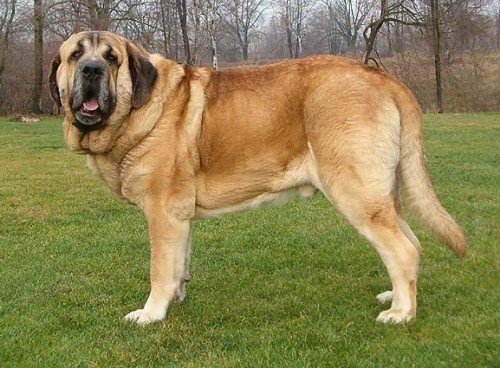
The Spanish Mastiff, also known as Mastín Español, is a large breed of dog that has been used for centuries as a livestock guardian in the Iberian Peninsula. With their imposing size and gentle temperament, these dogs have earned a loyal following among farmers, ranchers, and dog enthusiasts around the world.
Appearance
Spanish Mastiffs are a giant breed, with males standing at least 30 inches tall and weighing up to 200 pounds. Females are slightly smaller, typically reaching 28 inches in height and weighing up to 170 pounds. They have a thick, double coat that is designed to protect them from the harsh climate of the Spanish countryside. Their coat can come in a variety of colors, including fawn, brindle, and black.
The Spanish Mastiff is a large and impressive dog breed. Males typically stand at least 30 inches tall at the shoulder and can weigh up to 200 pounds, while females are slightly smaller, reaching up to 28 inches in height and weighing up to 170 pounds. They have a thick and dense double coat that helps protect them from the cold weather in their native Spain. The coat can be either short or medium in length and comes in a range of colors, including fawn, brindle, black, and gray. Their faces have a distinctive wrinkled appearance, and their eyes are usually dark and expressive. Overall, the Spanish Mastiff's size and appearance command respect and admiration from anyone who sees them.
Temperament
Despite their size, Spanish Mastiffs are known for their calm and gentle demeanor. They are fiercely loyal to their owners and protective of their family and livestock. They are intelligent and independent thinkers, which can make them difficult to train, but they respond well to positive reinforcement and consistency.
Spanish Mastiffs have a strong prey drive, so they are not recommended for families with small pets. They are also not the best choice for first-time dog owners, as their size and strong will require an experienced handler.
Livestock Guardian
The Spanish Mastiff was originally bred for the purpose of protecting livestock, and they excel in this role. They are instinctively protective of their flock or herd and will defend them from any threat, including wolves and other predators.
Their large size and intimidating presence is often enough to deter predators, but if necessary, they are more than capable of taking on a wolf or other large predator. Their protective instincts extend to their family as well, making them excellent guard dogs.
Health
Like all breeds, Spanish Mastiffs are prone to certain health conditions. Some of the most common issues include hip dysplasia, bloat, and heart problems. Regular vet checkups and a healthy diet can help prevent these issues from developing.
Like all dog breeds, Spanish Mastiffs can be prone to certain health issues. Here are some of the most common health concerns for the breed:
-
Hip Dysplasia: This is a common orthopedic condition that affects many large dog breeds. It occurs when the hip joint doesn't develop properly and can lead to arthritis and mobility issues.
-
Bloat: Also known as gastric torsion or twisted stomach, bloat is a potentially life-threatening condition that can occur in dogs with deep chests. It happens when the stomach fills with gas and twists on itself, cutting off blood flow to the organs.
-
Heart Problems: Dilated cardiomyopathy (DCM) is a common heart condition that affects some Spanish Mastiffs. It occurs when the heart muscle becomes weak and can't pump blood efficiently.
-
Joint Problems: Spanish Mastiffs can be prone to other joint problems besides hip dysplasia, including elbow dysplasia and arthritis.
To minimize the risk of these health problems, it's important to provide your Spanish Mastiff with regular veterinary checkups, a healthy diet, and plenty of exercise. It's also essential to work with a reputable breeder who screens their breeding dogs for these health issues.
Conclusion
The Spanish Mastiff is a unique and impressive breed that has been used for centuries as a livestock guardian. With their imposing size and gentle temperament, they make excellent family pets and guard dogs. However, they require an experienced handler and plenty of space to roam. If you are looking for a loyal and protective companion, the Spanish Mastiff may be the perfect dog for you








